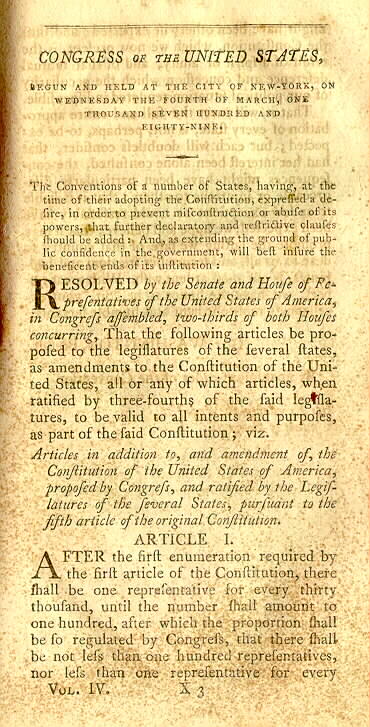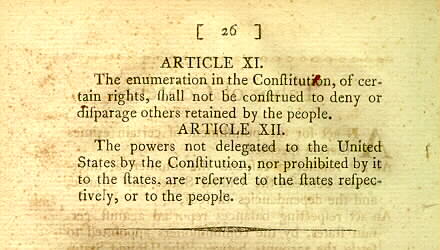Bill of Rights: 'Essential Civil Liberties' Of The People
As Washington was inaugurated as America's first president and the infant nation set about to establish a strong government, memories of civil rights violations during the colonial period were still vivid. However, in the draft constitution submitted to the states for ratification relatively few basic rights were included. Thomas Jefferson, U.S. Minister to France at the time, wrote James Madison that he was concerned about "the omission of a bill of rights....providing clearly....for freedom of religion, freedom of the press, protection against standing armies, and restriction against monopolies."A number of prominent Americans were alarmed at the omission of individual liberties in the proposed constitution. George Mason, author of the Virginia Bill of Rights, refused to sign the document, as did Elbridge Gerry of Massachusetts. Aware of the lack of these provisions, George Washington urged Congress in his first inaugural address to propose amendments that offered "a reverence for the characteristic rights of freemen and a regard for public harmony." Motivated by these leading Americans, Congress responded by submitting Amendments to the Constitution providing for essential civil liberties. They were officially proposed on September 25, 1789. Of the original twelve, Articles 3-12 were ratified. Accordingly, in 1791 these articles became the first ten amendments to the Constitution.....known collectively as The Bill of Rights. Here are the original twelve amendments as they appear in The Laws of The United States of America, printed by Richard Folwell, Philadelphia, in 1796. 1 1 |
 2 2 3 3 |
|
- The complete text of the original Bill of Rights
- The complete text of the present Bill of Rights
Popular Cities
Popular Subjects
Modern History Tutors
IB Music SL Tutors
Physical Chemistry Tutors
CompTIA A+ Tutors
Poetry Writing Tutors
Objective-C Tutors
UK GCSE Physics Tutors
Physics Tutors
Quantitative Methods Tutors
Ceramics Tutors
CCNA Security - Cisco Certified Network Associate-Security Tutors
OAE - Ohio Assessments for Educators Tutors
Hazardous Material Certification Exam Tutors
CFP Tutors
Actuarial Science Tutors
Kindergarten Science Tutors
Accent Reduction Tutors
Natural Resource Sociology Tutors
AP Physics 2 Tutors
Discrete Geometry Tutors
